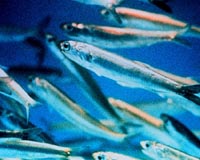 |
Paris (AFP) Nov 27, 2010 Fishing nations opted Saturday to leave catch limits for eastern Atlantic bluefin tuna virtually unchanged, lowering them from 13,500 tonnes this year to 12,900 tonnes in 2011. The decision was taken by the 48-member International Commission for the Conservation of Atlantic Tunas (ICCAT) at the close of a 10-day meeting in Paris. Some nations here favoured a much lower cap, or even a suspension of fishing, to ensure the species can return to sustainable levels. But industry representatives and the governments that back them insisted the new catch limits were sufficient. The head of the Japanese delegation, Masanori Miyahara, said they would help ensure the longterm future of the species. "The actual catch level will be around 11,000, which is a large reduction off current levels," he told AFP, saying some members had pledged not to use up their quotas. Japan is the world's top consumer of bluefin, buying up more than 80 percent of all the fish taken from the Mediterranean and eastern Atlantic. The United States, which had pushed for a sharper reduction in the catch levels, expressed disappointment. "I can't say that we acted in as precautionary a manner as I would have liked," said Russell Smith, a Department of Commerce official and head of the US delegation. Currently, eastern Atlantic bluefin are at 85 percent of historical levels and 30 percent of "maximum sustainable yield", the target for recovery. Green groups reacted angrily. "This outcome confirms that the bluefin's days are numbered and has demonstrated ICCAT's inability to act on its own mandate," said Greenpeace International oceans campaigner Oliver Knowles. "The word conservation' should be removed from ICCAT's name." European delegates refused to comment on the results, perhaps reflecting division within the bloc on how deeply to cut bluefin quotas. Going into the meeting fishing nations led by France pushed to maintain the status quo, even as the EU fisheries commissioner Maria Damanaki said they should be slashed to 6,000 tonnes. A backdoor attempt by France, meanwhile, to stretch out payments of its "tuna debt"-- incurred in 2007 when it surpassed a national quota of 5,000 tonnes by more than 100 percent -- failed. A proposal submitted on its behalf by Morocco was shot down in the final plenary. As things stand, France's bluefin haul for 2011 will drop from about 2,000 to 500 tonnes, barely enough to keep a handful of commercial vessels busy during the one- or two-month long fishing season. Sue Lieberman of the Pew Environment Group said current quotas do not take into account ICCAT's history of mismanagement. "It ignores all the evidence of fraud, illegal fishing and laundering," she said.
Share This Article With Planet Earth
Related Links Water News - Science, Technology and Politics
 Scientists Question Fisheries Health Test
Scientists Question Fisheries Health TestCanberra, Australia (SPX) Nov 26, 2010 A measure widely advocated as a means of assessing the health of marine ecosystems is an ineffective guide to trends in biodiversity, and more direct monitoring is needed, a new study has found. The findings followed an examination of whether changes in fishery catches reflect changes in the structure of marine food webs, and therefore are a suitable guide to assess the impacts of fishing ... read more |
|
| The content herein, unless otherwise known to be public domain, are Copyright 1995-2010 - SpaceDaily. AFP and UPI Wire Stories are copyright Agence France-Presse and United Press International. ESA Portal Reports are copyright European Space Agency. All NASA sourced material is public domain. Additional copyrights may apply in whole or part to other bona fide parties. Advertising does not imply endorsement,agreement or approval of any opinions, statements or information provided by SpaceDaily on any Web page published or hosted by SpaceDaily. Privacy Statement |